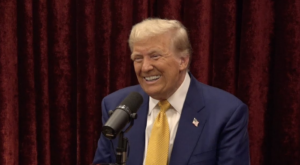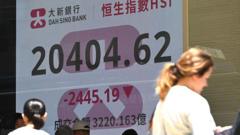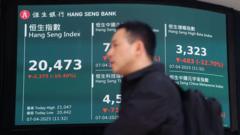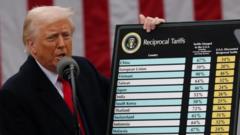The global stock market has taken a significant hit due to newly imposed tariffs, raising concerns about future economic stability and the effect on pension plans.
**Global Markets' Turmoil: Understanding the Impact of Tariffs**
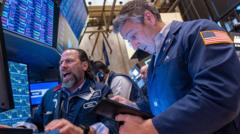
**Global Markets' Turmoil: Understanding the Impact of Tariffs**
A deep dive into the recent stock market declines and their implications on the economy.
The worldwide stock markets are experiencing turmoil following the United States' drastic tariff decisions, leading many to speculate whether we are on the brink of a stock market "crash." Typically, the term crash refers to a steep decline, often exceeding 20% in a short timeframe. Although historic events like Black Monday in 1987 saw a staggering 23% drop in the US stock market within a single day, current figures suggest a loss of approximately 17% since its peak earlier this year. The UK's stock market, while also suffering losses, is slightly insulated by earlier closing hours, which allow it to adapt to US trading.
Analysts are quick to note that the recent downturn is reminiscent of the panic witnessed during the onset of the COVID-19 pandemic in early 2020. A decline of 20% is generally categorized as a "bear market," suggesting that the tendency leans more towards further declines. But how does this affect individuals, especially those with retirement plans?
Most people’s connection to the stock market comes through their pension plans. Defined benefit schemes typically provide a stable income, while defined contribution plans may suffer more as their value fluctuates with market performance. However, it's essential to recognize that not all pension contributions are invested in stocks; a significant portion goes into more stable government bonds, which often increase in value when stocks fall. Thus, investors closer to retirement may find themselves less exposed to the recent volatility.
It is crucial to assess the implications of these events. A fall in stock prices signals a downturn in expected future profits for companies, which could result in reduced investments and job cuts as companies brace for potentially lowered demand caused by the tariffs. This situation suggests an ominous economic outlook rather than solely a concern for individual pension valuations.
Historical patterns indicate that while stock market fluctuations are common, the underlying health of the economy is at stake. The current turmoil initiated by tariffs suggests a cautionary sign, reflecting broader economic uncertainties rather than a mere financial blip. As talks between China and the US escalate, the ramifications of these tariffs and their economic toll remain a focal point for investors and workers alike.
Analysts are quick to note that the recent downturn is reminiscent of the panic witnessed during the onset of the COVID-19 pandemic in early 2020. A decline of 20% is generally categorized as a "bear market," suggesting that the tendency leans more towards further declines. But how does this affect individuals, especially those with retirement plans?
Most people’s connection to the stock market comes through their pension plans. Defined benefit schemes typically provide a stable income, while defined contribution plans may suffer more as their value fluctuates with market performance. However, it's essential to recognize that not all pension contributions are invested in stocks; a significant portion goes into more stable government bonds, which often increase in value when stocks fall. Thus, investors closer to retirement may find themselves less exposed to the recent volatility.
It is crucial to assess the implications of these events. A fall in stock prices signals a downturn in expected future profits for companies, which could result in reduced investments and job cuts as companies brace for potentially lowered demand caused by the tariffs. This situation suggests an ominous economic outlook rather than solely a concern for individual pension valuations.
Historical patterns indicate that while stock market fluctuations are common, the underlying health of the economy is at stake. The current turmoil initiated by tariffs suggests a cautionary sign, reflecting broader economic uncertainties rather than a mere financial blip. As talks between China and the US escalate, the ramifications of these tariffs and their economic toll remain a focal point for investors and workers alike.

